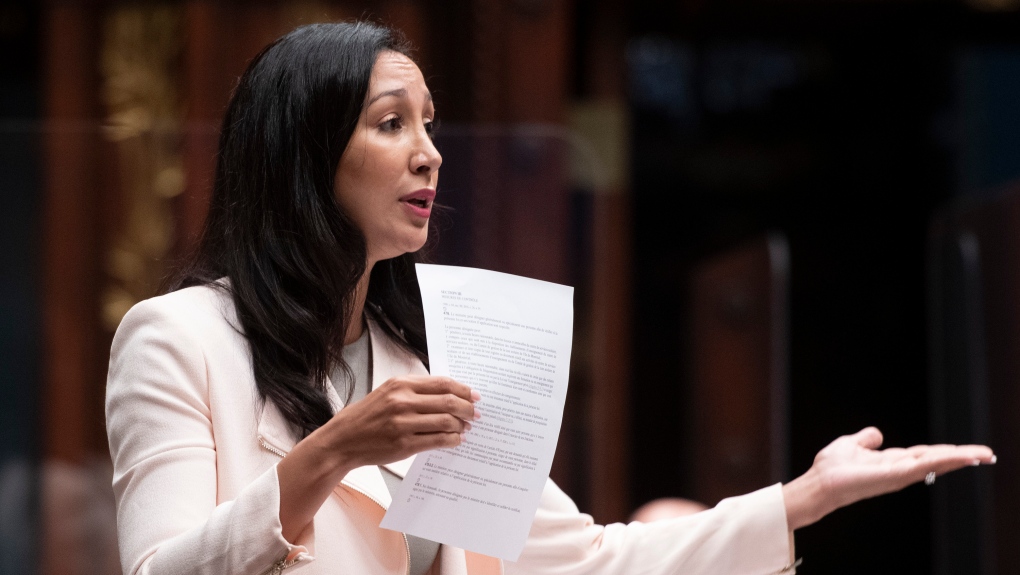Air quality and COVID-19: Quebec Opposition MNA tables bill to install air monitors, purifiers in every classroom
A bill introduced to the national assembly Wednesday would equip every Quebec classroom with an air purifier and sensor that monitors carbon dioxide levels, impose new maximum CO2 concentrations, and make CO2 data available to the public.
Higher levels of CO2 concentrations suggest air isn’t circulating properly indoors, signifying a higher potential for the spread of COVID-19. While the province considers 1,000 parts per million (ppm) to be an ideal target, data presented by the ministry last week suggests 724 classrooms have a weekly average CO2 concentration that exceeds 1,500 parts per million (ppm), while 72 classrooms exceed 2,000 ppm.
Quebec Liberal MNA Marwah Rizqy tabled Bill 192, An Act to ensure student health and safety in the classroom by regulating ambient air quality in schools, with hopes that the national assembly will move quickly to pass it.
“We can work on this bill right now,” Rizqy told reporters in Quebec City.
“The (Parti Quebecois) makes a big deal about King Charles, and now we are able to table a bill within a few days,” she said in reference to Bill 4, which aims to make the King's oath optional and allow PQ members to sit without swearing allegiance to the British monarchy.
Time is of the essence, as it was highlighted earlier this month by Quebec Education Minister Bernard Drainville that carbon dioxide concentrations are likely to rise as the weather gets colder and schools close their windows.
 Quebec Liberal Opposition Education and Higher Education Critic Marwah Rizqy questions the government during question period in this file photo dated Thursday, September 23, 2021. THE CANADIAN PRESS/Jacques Boissinot
Quebec Liberal Opposition Education and Higher Education Critic Marwah Rizqy questions the government during question period in this file photo dated Thursday, September 23, 2021. THE CANADIAN PRESS/Jacques Boissinot
Under Rizqy’s bill, the 1,000 ppm target would become the legal limit. Schools would be compelled to provide weekly reports to the ministry, which would then be made public.
The proposed limit is even tighter during pandemic times, restricting the acceptable limit to 800 ppm until the WHO says the health crisis is over.
"The particles, they are in the air and they remain in the air for 12 to 48 hours," said Nancy Delgrave, scientific coordinator of the COVID-STOP group, who appeared with Rizqy during Wednesday's press conference.
"To reduce the contagion of respiratory viruses, and also to reduce their severity, it is important to treat the air," she said.
A VOW FROM THE FORMER MINISTER
Last year, then-Education Minister Jean-Francois Roberge vowed to equip classrooms with CO2 detectors by the end of the 2022 school year, following concerns over air quality in schools.
At the time, the minister released a letter to directors general outlining his plans to require the readers in libraries, gymnasiums, daycare rooms and other spaces.
CTV News has reached out to the ministry for a status update on the rollout of the devices.
"Laying down a bill at this point is redundant, I believe," said Quebec Provincial Association of Teachers President Heidi Yetman.
She told CTV she would rather the province prioritize classroom repairs.
"We need to make sure the windows are able to open. We have to make sure that we have ventilation," she said.
-- Published with files from The Canadian Press
CTVNews.ca Top Stories

WATCH Woman,50, critically injured in explosive Ottawa crash caught on camera, police looking for witnesses
Dashcam footage sent to CTV News shows a vehicle travelling at a high rate of speed in the wrong direction before striking and damaging a hydro pole.
Here’s why you should monitor your blood pressure, keep it in check
An Ottawa pharmacist says blood pressure is a good indicator of overall health, noting the importance of keeping it at healthy rates.
Heaviest snowfall in a decade possible in some areas as winter storm threatens U.S.
A blast of snow, ice, wind and plunging temperatures stirred up dangerous travel conditions in parts of the central U.S. on Sunday, as a disruptive winter storm brought the possibility of the 'heaviest snowfall in a decade' to some areas.
Maserati driver seriously injures 2 in Surrey hit-and-run: police
The driver of a Maserati fled the scene of a crash in Surrey that left two people seriously injured Saturday night, according to authorities.
Air Canada passengers living with extra baggage fees
Some Air Canada passengers at Montreal’s Trudeau Airport were annoyed that they will now have to pay additional fees for their carry-on luggage.
Russia 'getting what it deserves,' Ukraine says, after launching counterattack in border region
Ukraine has launched a counterattack in the southern Russian border region of Kursk, warning that Russia is 'getting what it deserves.'
Here’s the latest on this weekend's winter storms in Canada
From snow, to high winds, to extreme cold, much of Canada is under a severe weather alert this weekend. Here's what to expect in your region.
Big Dreams for 'The Littlest Hobo': Fans push for star on Canada’s Walk of Fame
When Terry Bush co-wrote and sang Maybe Tomorrow, the theme song for The Littlest Hobo, he thought it was just another gig—a catchy tune for a TV show about a wandering German Shepherd. Forty-five years later, that 'little tune' still tugs at heartstrings, pops up on playlists, and has even been known to be played at closing time in English pubs.
Mark Carney reaches out to dozens of Liberal MPs ahead of potential leadership campaign
Mark Carney, the former Bank of Canada and Bank of England governor, is actively considering running in a potential Liberal party leadership race should Justin Trudeau resign, sources tell CTV News.































